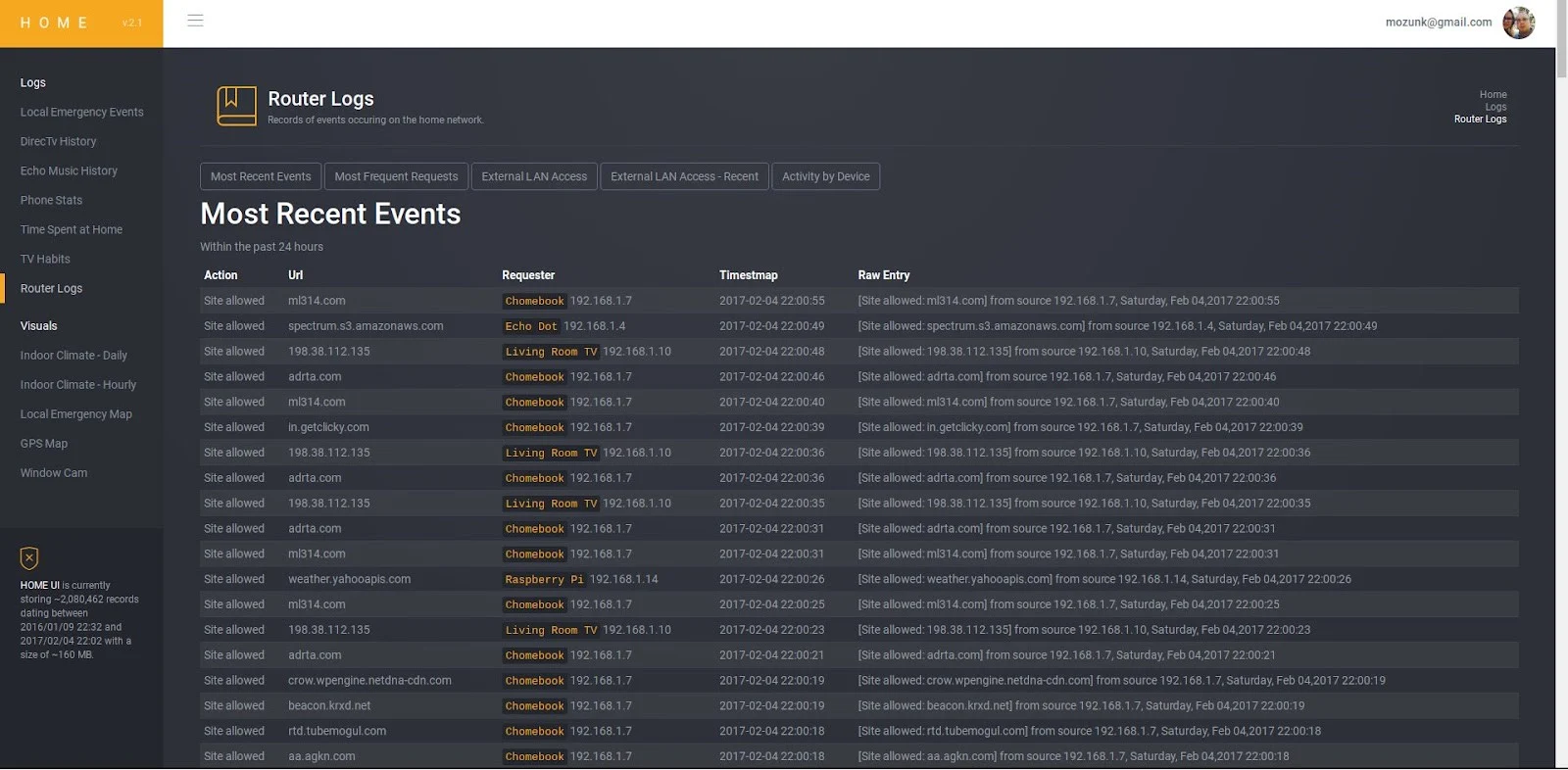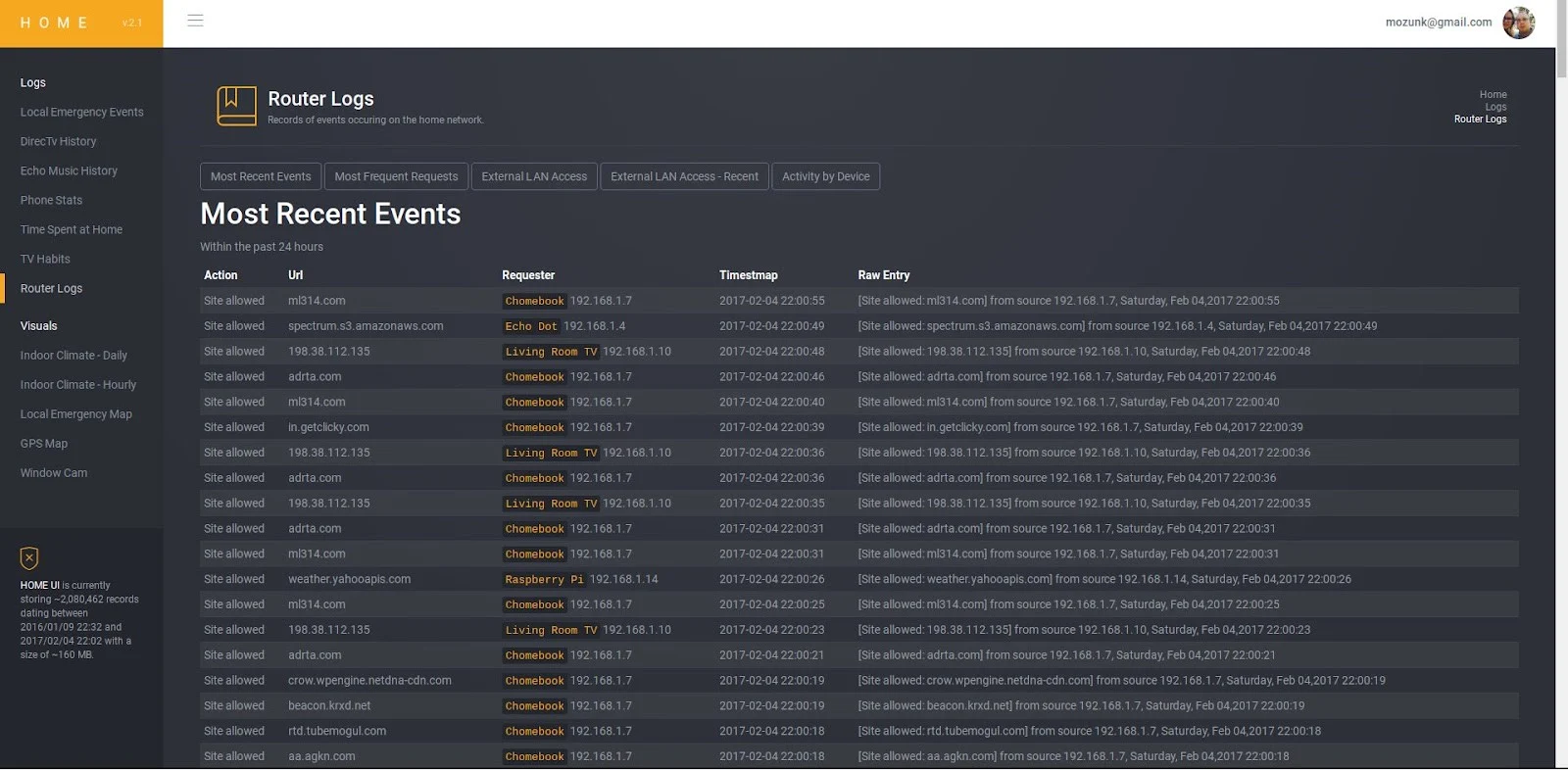Introduction
Routers are an integral part of our modern connected world, allowing us to access the internet and communicate with the digital realm. They serve as the central hub for our devices, directing traffic and ensuring efficient data transmission. But did you know that routers also keep a history of our digital activities?
When we browse the web, stream content, or download files, our routers store a record of these activities. This history can include websites visited, search queries, and even the devices connected to the network. While this can be a helpful feature for monitoring and troubleshooting purposes, it also raises concerns about privacy and security.
In this article, we will delve into the reasons why routers keep history, the duration for which they typically retain this information, and the factors that influence the retention period. We will also explore ways to manage and clear router history to maintain a cleaner and more private digital footprint.
Understanding why routers keep history is essential, as it allows us to make informed decisions about our online activities and take appropriate steps to protect our privacy. So let’s dive deeper into this fascinating aspect of router technology and gain insights into how our digital footprint is stored and managed.
Why do routers keep history?
Routers keep a history of our internet activities for a variety of reasons. Understanding these reasons can shed light on the purpose and implications of this practice.
One primary reason routers keep history is for diagnostic and troubleshooting purposes. Should any issues arise with the network or a particular device, network administrators can refer to the router’s history to identify the source of the problem. This can help in pinpointing faulty connections, identifying bandwidth hogs, and detecting suspicious activity.
Another reason for keeping history is to facilitate network management and optimization. By analyzing the browsing patterns and traffic flows recorded in the router’s history, administrators can gain insights into usage patterns, peak operating hours, and popular websites or services. This information allows them to allocate bandwidth resources effectively, prioritize critical tasks, and implement network optimizations to enhance overall performance.
Furthermore, router history can provide valuable information for security purposes. In the event of a security breach or suspicious activity, the history can be used to investigate and track the source of the incident. This can be crucial in identifying unauthorized access attempts, potential security vulnerabilities, or even potential cyberattacks.
Additionally, keeping a history of connected devices can be beneficial for network security and management. By logging and tracking the devices that have accessed the network, administrators can monitor for any unauthorized or suspicious devices attempting to join the network. This can help prevent unauthorized access or potential breaches.
While the aforementioned reasons highlight the benefits of router history, it is important to note that privacy concerns are an inherent aspect of this practice. Router history can contain sensitive information such as browsing habits, search queries, and connected devices. Therefore, it is crucial to strike a balance between the convenience and utility of the router’s historical data and the privacy and security of its users.
Now that we understand why routers keep history, let us delve into the important question of how long routers retain this information and what factors influence the duration of data storage.
How long do routers keep history?
The duration for which routers keep history varies depending on various factors. While there is no definitive answer, it is important to understand the general practices surrounding data retention in routers.
In many cases, routers store history on a rolling basis. This means that as new data is generated, older data is overwritten or deleted. The specific timeframe for keeping the history can range from a few hours to a few days or even weeks, depending on the router’s settings and configuration.
The retention period of router history can be influenced by factors such as router model, firmware version, and administrative settings. Some routers offer customizable options where users can adjust the duration of history storage according to their preferences and needs.
Commercial routers or routers used in corporate environments might have longer retention periods due to compliance regulations or internal policies. These routers may store history for several months to facilitate network monitoring, auditing, or forensics analysis.
On the other hand, routers used in home environments typically have shorter retention periods, often ranging from a few hours to a couple of days. This shorter duration is generally sufficient for basic troubleshooting and monitoring needs.
It is crucial to note that not all routers store the same types of history. Some routers might only log basic connection information, such as IP addresses and timestamps, while others may record more detailed browsing activity, including websites visited, search queries, and data usage. The retention period can depend on the type of data being stored as well.
Additionally, it is important to keep in mind that router history is stored locally on the router itself and is not shared with external parties unless specifically configured to do so. However, it is still essential to prioritize privacy by taking steps to manage and clear router history regularly.
Now that we have explored how long routers typically keep history, let’s examine the various factors that can influence the retention period.
Factors that affect the retention of router history
The retention of router history can be influenced by several factors that vary from router to router. Understanding these factors can provide insights into how long your router may store data and what options you have for managing that data.
1. Router model and firmware version: Different router models and firmware versions have varying capabilities and settings when it comes to history retention. Newer models or firmware versions may offer more advanced features, including customizable retention settings.
2. Administrative settings: The retention period can be adjusted based on the settings configured by the network administrator or the router owner. Some routers allow users to set the duration for which history is stored, giving them greater control over their data.
3. Storage capacity: The available storage capacity within the router can also affect the retention of history. Routers with limited storage space may have shorter retention periods, as data needs to be overwritten or deleted to make room for new entries.
4. Usage patterns: The amount and frequency of data generated can impact how long history is retained. If the router is used heavily, generating a significant amount of browsing activity and traffic, the history may be overwritten more frequently to accommodate new data. Conversely, if the router experiences minimal usage, the history may be retained for a longer period.
5. Security and compliance requirements: In certain cases, routers used in commercial or enterprise settings may have longer retention periods due to security and compliance requirements. These longer retention periods support network monitoring, auditing, and compliance with industry regulations.
It is important to note that while these factors can influence the retention period of router history, they may vary depending on the specific router and its configuration. It is recommended to consult the router’s user manual or the manufacturer’s website for detailed information about the retention capabilities and options available for your specific router model.
Now that we understand the factors that affect the retention of router history, let’s explore ways to manage and clear this history to ensure privacy and maintain a cleaner digital footprint.
Ways to manage router history
Managing router history is an important step in protecting your privacy and ensuring a cleaner digital footprint. Here are some effective ways to manage and control the history stored in your router:
1. Change default settings: Start by changing the default login credentials of your router’s administrative interface. This will prevent unauthorized access to the router and its history.
2. Adjust retention settings: If your router allows it, adjust the retention settings to align with your privacy concerns and needs. You may want to consider shortening the retention period to minimize the amount of history stored.
3. Regularly clear history: Many routers provide an option to manually clear the stored history. This can be done through the router’s administrative interface or settings page. Regularly clearing the history will help maintain your privacy by removing any stored data.
4. Use private browsing modes: When browsing the internet, consider using private or incognito browsing modes offered by most web browsers. These modes do not save browsing history, cookies, or other temporary data, reducing the amount of information stored on your router.
5. Utilize Virtual Private Networks (VPNs): A VPN encrypts your internet traffic and routes it through secure servers, helping to safeguard your online activities from prying eyes. By using a VPN, the data transmitted from your router will be protected, making it harder for anyone to access or monitor your browsing history.
6. Regularly update router firmware: Keep your router’s firmware up to date. Firmware updates often include bug fixes, security enhancements, and new features that can improve the overall security and privacy of your router.
7. Disable logging: If your router allows it, consider disabling logging or reducing the level of logging for non-essential information. This can help limit the amount of data stored in the router’s history.
8. Utilize third-party software: There are third-party software tools available that can help manage and control the history stored in your router. These tools provide additional features and options for clearing and managing router history effectively.
By implementing these practices, you can take control of your router’s history and ensure that your privacy is protected. Remember to regularly review and update your router’s settings to align with your privacy preferences.
Now that we have explored the ways to manage and clear router history, let’s discuss the importance of clearing router history regularly.
The importance of clearing router history
Regularly clearing router history is essential for maintaining privacy, protecting sensitive information, and ensuring a cleaner digital footprint. Here are the key reasons why clearing router history is important:
1. Privacy protection: Router history can contain sensitive information such as websites visited, search queries, and connected devices. Clearing the history helps prevent unauthorized access to this information and reduces the risk of your online activities being tracked or monitored.
2. Data security: Clearing router history is crucial for protecting your data from potential security breaches. By removing stored history, you minimize the chances of sensitive information falling into the wrong hands, reducing the risk of identity theft or cyberattacks.
3. Avoid targeted advertising: Online advertisers often track browsing history to deliver targeted ads. Clearing router history helps prevent ad networks from collecting data and tailoring advertisements based on your browsing habits, ensuring a more private and personalized online experience.
4. Maintain a cleaner digital footprint: Clearing router history regularly helps maintain a cleaner digital footprint. Removing unnecessary data reduces clutter and allows for a more efficient use of storage space on your router, resulting in improved performance.
5. Protect against legal issues: Router history can potentially contain evidence of illegal online activities. By regularly clearing the history, you minimize the chances of inadvertently leaving a digital trail that could be used against you in legal proceedings.
6. Enhance network security: Clearing the router history prevents unauthorized users from accessing information about previously connected devices. This helps protect against potential security breaches and unauthorized access, ensuring the integrity and security of your network.
It’s important to note that clearing router history alone may not guarantee complete privacy. Other measures, such as using encryption, strong passwords, and regularly updating your router’s firmware, should also be taken to ensure comprehensive data protection.
By clearing router history regularly, you can safeguard your privacy, protect sensitive information, and maintain a cleaner and more secure digital presence. Make it a part of your routine to manage and clear your router’s history to maintain control over your personal data.
Now that we understand the importance of clearing router history, let’s conclude our discussion.
Conclusion
Routers play a crucial role in our connected world, but they also have the capability to store a record of our internet activities. Understanding why routers keep history, how long they retain it, and the factors that influence retention is vital for safeguarding privacy and maintaining control over our digital footprint.
Router history serves important purposes such as network troubleshooting, optimization, and security monitoring. However, it is imperative to balance these benefits with our privacy concerns. By adjusting retention settings, regularly clearing history, and utilizing privacy-enhancing tools like VPNs, we can take proactive steps to protect our data.
Factors such as router model, firmware version, administrative settings, and storage capacity can affect the duration for which router history is stored. It is essential to stay informed about these factors and consult the manufacturer’s documentation to make informed decisions about managing router history.
Regularly managing and clearing router history is key to maintaining privacy, data security, and a cleaner digital footprint. It helps protect against unauthorized access, targeted advertising, legal issues, and enhances overall network security.
By integrating these practices into our digital routines, we can have more control over our online activities and reduce the risks associated with stored router history. Remember, protecting our privacy is an ongoing effort, and staying aware and proactive is the key to maintaining a secure and private online presence.
So take the necessary steps to manage and clear your router history regularly, and enjoy a safer and more private browsing experience.

























